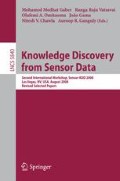Abstract
Analyzing sensor data in pervasive computing applications brings unique challenges to the KDD community. The challenge is heightened when the underlying data source is dynamic and the patterns change. We introduce a new adaptive mining framework that detects patterns in sensor data, and more importantly, adapts to the changes in the underlying model. In our framework, the frequent and periodic patterns of data are first discovered by the Frequent and Periodic Pattern Miner (FPPM) algorithm; and then any changes in the discovered patterns over the lifetime of the system are discovered by the Pattern Adaptation Miner (PAM) algorithm, in order to adapt to the changing environment. This framework also captures vital context information present in pervasive computing applications, such as the startup triggers and temporal information. In this paper, we present a description of our mining framework and validate the approach using data collected in the CASAS smart home testbed.
Access this chapter
Tax calculation will be finalised at checkout
Purchases are for personal use only
Preview
Unable to display preview. Download preview PDF.
References
Abowd, G.D., Mynatt, E.D.: Designing for the human experience in smart environments. In: Smart Environments: Technology, Protocols and Applications, pp. 153–174 (2005)
Agrawal, R., Srikant, R.: Mining Sequential Patterns. In: Proc. 11th Int’l Conf. Data Engineering, pp. 3–14 (1995)
Bettini, C., Wang, S.X., Jagodia, S., Lin, J.-L.: Discovering Frequent Event Patterns with Multiple Granularities in Time Sequences. IEEE Transactions on Knowledge and Data Engineering 10(2), 222–237 (1998)
Fawcett, T., Provost, F.: Activity Monitoring: Noticing Interesting Changes in Behavior. In: Proc. Fifth Int’l Conf. Knowledge Discovery and Data Mining, pp. 53–62 (1999)
Gaber, M.M., Krishnaswamy, S.: Adaptive Mining Techniques for Data Streams Using Algorithm Output Granularity. In: The Australasian Data Mining Workshop (AusDM 2003), Canberra, Australia (2003)
Helal, S., Mann, W.: The Gator Tech Smart House: A programmable pervasive space. IEEE Computer 38(3), 50–60 (2005)
Laxman, S., Sastry, P.S.: A survey of temporal data mining. Sadhana 31(Part 2), 173–198 (2006)
Lee, C.H., Chen, M.-S., Lin, C.-R.: Progressive pattern miner: An efficient algorithm for mining general temporal association rules. IEEE Transactions on Knowledge and Data Engineering 15, 1004–1017 (2003)
Lin, W., Alvarez, S.A., Ruiz, C.: Efficient Adaptive-Support Association Rule Mining for Recommender Systems. In: Data Mining and Knowledge Discovery. Springer, Heidelberg (2002)
Mannila, H., Toivonen, H.: Discovering Generalised Episodes Using Minimal Occurences. In: Proc. Second Int’l Conf. Knowledge Discovery and Data Mining, pp. 146–151 (1996)
Rissanen, J.: Modeling by shortest data description. Automatica 14, 465–471 (1978)
Roddick, J.F., Spiliopoulou, M.: A Survey of Temporal Knowledge Discovery Paradigms and Methods. IEEE Transactions on Knowledge and Data Engineering 14(4) (2002)
Sutton, R.S.: On the significance of Markov decision processes. In: Gerstner, W., Hasler, M., Germond, A., Nicoud, J.-D. (eds.) ICANN 1997. LNCS, vol. 1327, pp. 273–282. Springer, Heidelberg (1997)
Vaseghi, S.V.: State duration modeling in hidden Markov models. Signal Processing 41(1), 31–41 (1995)
Vainio, A.-M., Vanhala, J.: Continuous-time Fuzzy Control and Learning Methods. In: ISCIT 2007, Sydney, Australia (October 2007)
Youngblood, G.M., Cook, D.J.: Data mining for hierarchical model creation. IEEE Transactions on Systems, Man, and Cybernetics, Part C (2007)
Author information
Authors and Affiliations
Editor information
Editors and Affiliations
Rights and permissions
Copyright information
© 2010 Springer-Verlag Berlin Heidelberg
About this paper
Cite this paper
Rashidi, P., Cook, D.J. (2010). An Adaptive Sensor Mining Framework for Pervasive Computing Applications. In: Gaber, M.M., Vatsavai, R.R., Omitaomu, O.A., Gama, J., Chawla, N.V., Ganguly, A.R. (eds) Knowledge Discovery from Sensor Data. Sensor-KDD 2008. Lecture Notes in Computer Science, vol 5840. Springer, Berlin, Heidelberg. https://doi.org/10.1007/978-3-642-12519-5_9
Download citation
DOI: https://doi.org/10.1007/978-3-642-12519-5_9
Publisher Name: Springer, Berlin, Heidelberg
Print ISBN: 978-3-642-12518-8
Online ISBN: 978-3-642-12519-5
eBook Packages: Computer ScienceComputer Science (R0)

